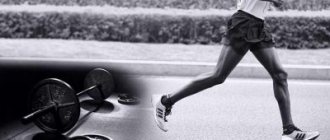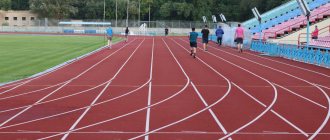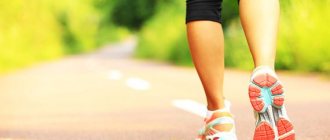Is it possible to run immediately after eating?
Everyone knows that running immediately after eating is harmful and it is better to wait some time after eating. But is it? And how long is it recommended to wait after eating before going for a run?
Why can't you run after eating?
If you take sports seriously, you must develop a plan that indicates the day of the week and time of exercise. In this situation, you can always have time to eat in advance and go for a run.
But in everyday life, unforeseen circumstances happen: being late at work, getting caught in a traffic jam and dozens of other reasons that will lead to the fact that you won’t be able to eat on time and you will have to run on an empty stomach or with a full stomach, but this is not recommended.
Why?
There are two reasons why it is highly undesirable to run with a full belly:
You can laugh and say: “How can the stomach be an extra burden? And I didn’t eat that much!” - although in fact, eating food adds 500-1000 grams to your weight. You don’t use weights because they will make it harder, do you? The average running weight weighs 1 kilogram.
Attention!
Such a prosaic name for 2 reasons why you should not eat food before training is not without reason. The fact is that during running, a large amount of blood moves to the striated muscles (arms, legs, back, etc.). The same thing happens after eating, only blood flows from the striated muscles to the smooth muscles (all digestive organs and not only).
Now imagine that you ate food and went for a run. In this case, the body will need blood to operate the striated muscles of the skeleton and the smooth muscles of the internal organs.
T-shirt advertising
What does this mean? The body reacts differently to physical activity and incoming food. Physical activity causes the body to produce adrenaline and norepinephrine to protect the body from overwork. The food consumed in this case is ballast. What do they do with ballast? Right.
How long after eating can you run?
The permissible period after which you can go for a run is equal to the time it takes the body to digest most of the food received, which means 60 - 120 minutes .
In reality, 1-2 hours is an average and much depends on the food that was consumed. The fattier the food, the more time the body needs to digest it, and vice versa. Individual tolerance to incoming substances also plays a role. For example, someone may metabolize protein faster or slower than another.
If there was a light snack, for example, a banana, then the absorption time is reduced to 30-60 minutes. Conversely, if a cutlet or chicken leg was eaten, then the digestion time can reach 3-4 hours.
What to eat if you're about to go jogging and you're hungry?
It happens that it’s time to go for a run, but you feel hunger emerging inside, or you just came home and want to immediately go in for sports. In this case, it is definitely worth having a snack rather than running on an empty stomach.
One of the options was presented above “eat a banana”, or in some cases it is recommended to eat yogurt. But yogurt is a dairy product that takes 2-3 hours to be absorbed by the body.
But bananas are full of fast carbohydrates that are digested within 30 minutes.
Bananas are often used to replenish essential nutrients during marathon races, which gives another bonus to this product.
Quickly digestible foods include honey, which in addition to being satiating contains a large amount of carbohydrates. Despite prejudices, honey is absorbed as quickly as a banana. Therefore, tea with honey half an hour before a run is a good option.
Do you run immediately after eating?
Source: https://beguza.ru/beg-posle-edy-za-i-protiv/
How to properly run in the evening - warm up before bed
Morning jogging sounds great, it evokes respect for those who are able to put on a tracksuit in the morning and run along the streets that have not yet woken up, or along the paths of the park, meeting the dawn in motion.
However, there are many supporters of jogging in the evenings, who believe that there is nothing better than running after a working day spent mostly sitting at a desk.
What time of day is ideal for running is debatable; It’s best to choose the time that’s most suitable for you for jogging, otherwise the enthusiasm of a novice runner may not last long
In any case, it is important how to properly run in the evenings to bring the greatest benefit to the body.
How to get ready for an evening run
Note!
Even for those who experience a surge in vital energy in the late afternoon, it can be difficult to force yourself to run when most people are having dinner or getting ready to go to bed.
In such cases, many people come up with various excuses to postpone running until another day, but this usually leads to the fact that the person stops running altogether, or does it only occasionally.
How to get yourself ready for a run and ignore excuses for not wanting to go on the treadmill in the evening?
“I'm tired” is a common excuse for people who want to skip a run. Indeed, when the working day is left behind, the crush in crowded public transport or traffic jams, and also household chores - you just want to relax.
Give yourself 15-20 minutes to rest: do nothing, or do something enjoyable and effortless, such as listening to music or watching TV. At the same time, you must remember that in fifteen minutes you will have to get up, change clothes, and go for a run.
And also remember that the best rest is a change of activity, which means you can also rest while jogging.
Housework, communication with your spouse, children, friends and relatives, going to restaurants and movies - all of this, of course, cannot be completely abandoned, but if you notice that you have less and less time for exercise, work on your schedule and Set aside time for jogging. After all, if you don't keep your body in good shape, having fun will become less and less enjoyable over time. Treat jogging like brushing your teeth - you shouldn't skip it simply because sooner or later it will have a bad effect on your health.
If you are afraid to run in the evenings
In this case, there are two options - either run in the morning or afternoon, or do everything possible to ensure your own safety: run along illuminated streets, always have a mobile phone with you, and so on. Below we will talk in more detail about safety during evening runs.
If you have no excuses
Just don't feel like running after work? Or do you not feel like running or doing any other sports at all? Tell yourself that you will only run in the evenings for three to four weeks, and during this time, do not avoid training under any circumstances.
Psychologists say that during this time a person develops new habits, which means that after about a month you will no longer have to persuade yourself to go for a run.
Another option: agree to run with a friend - it is advisable that he has been running for a long time and is not inclined to skip training. Experts say that it is much more difficult for people to refuse activities, even if not the most pleasant ones, that are somehow connected with other people.
The most important!
There will still be moments of weakness, but you will feel embarrassed in front of your friend not to go for a run simply because you are tired or cannot plan your day so that there is time for exercise.
Recommendations for those who run in the evenings
Is it possible to run after eating
Training must be planned in accordance with your daily routine. However, this does not always work out. It is often necessary to eat immediately before training. So is it possible to run after eating?
It will be extremely difficult to run immediately after eating. During digestion, the body sends most of the blood to the stomach.
Important!
But if you begin to use muscles during the digestion process, then the body will have to spend additional resources to supply them with a sufficient amount of blood. Thus, there will be a shortage in both places.
pain may caused by a lack of blood in the body in its individual organs.
What to do if there is little time left before a run
You need to know that all food is divided into 4 categories: fast carbohydrates, slow carbohydrates, proteins and fats.
Fast carbohydrates are absorbed very quickly. These include all types of sugars, honey. Therefore, if you drink sweet tea, or preferably tea with honey, you will be able to run in literally 15-20 minutes.
Slow-release carbohydrates are the best source of energy for running. They usually take about one and a half hours to digest. But depending on the individual characteristics of a person, they can be digested from 1 hour to 3 hours. Slow carbohydrates include bread, pasta, buckwheat, pearl barley, and rice porridge.
Protein foods, which include some vegetables, dairy products, and some types of cereals, take 2-3 hours to digest. Therefore, if you eat such food, it will be extremely difficult to run right away, since the stomach will digest the food.
Fatty foods, which include sour cream, canned food, lard, etc., take more than 3 hours to digest, and it is strongly not recommended to take it before jogging.
Thus, you should not run immediately after eating, as this will cause pain in the internal organs and the workout will be ineffective. But at the same time, it is possible to replenish the supply of easily digestible carbohydrates in the body by taking fast carbohydrates, and start running within half an hour after eating.
Source: https://scfoton.ru/mozhno-li-begat-posle-edy
What does jogging do?
Jogging allows you to solve the widest possible range of tasks, however, the list of them can be transformed depending on whether it is morning or evening. In our review, we will look at both options, and also offer useful practical tips on how to maintain a great mood and motivation.
Jogging in the morning
It is a known fact that not all people’s muscles “wake up” early in the morning, but it is regular jogging that allows the muscles to wake up:
- Morning is that period of the day when a person receives a charge of energy and positivity for the whole day; the air is cleaner in the morning.
- Running in the morning allows you to “burn” more calories than running in the evening.
- The spine receives less stress compared to evening workouts.
- After a morning run, productivity increases, which of course leads to a happy, stress-free end to the day.
Good to know. Before going for a morning jog, it is recommended to prepare for the stress by taking, for example, a shower with alternating hot and cold water. It will also be useful for those who are overweight to exercise in the morning. You shouldn't eat before your morning run. Running every day leads to tangible results.
Jogging in the evening
Many people, for one reason or another, do not have the opportunity to go for a morning jog, but go for an evening jog. Are there any benefits to running in the evening? - running fans ask themselves this question.
There is no doubt about it, of course there is, especially since for some this is the only opportunity to engage in physical activity all day. Or just take a break from everything that an ordinary person faces during the day.
- In the evening you need physical relaxation.
- The duration of the lesson should be 10-15 minutes, in the future it is recommended to increase the race time.
- While running, take breaks, changing a slow run to a fast walk.
- In the evening, it is better to jog 2-3 hours after dinner, thereby providing the necessary release, but also providing the necessary source of energy.
It is evening jogging that provides comfortable and deep sleep.
You need to choose the place for jogging in the evening more carefully (during the day the air becomes saturated with all kinds of exhaust gases), it is preferable to choose parks or areas away from the streets.
Nutrition before training: trainer's advice
This time we decided to talk about proper nutrition before training with a person who really knows a lot about it. Irina Ryzhikova is a fitness trainer with extensive experience and an equally large number of satisfied clients. In the past, she was involved in athletics (100-meter sprint), so she knows first-hand about running and everything connected with it.
Dossier:
People who lead an active lifestyle and play sports need to monitor their diet more closely, since with a monotonous diet, the body does not receive the substances it needs, which negatively affects health and results. Therefore, if you want to run long and far, you need to seriously think about your daily diet.
What foods should you eat before running and why?
The meal before such a workout should mainly consist of foods containing carbohydrates with a low content of rough fiber (fiber can irritate the intestinal walls, causing nausea, colic, and bloating). Carbohydrates are a kind of “fuel” that supplies the body with energy throughout the entire workout. You should also minimize your intake of fat and protein.
Foods that are best for replenishing energy before a run
Honey is an ideal energy product (in the absence of allergies). The main composition of honey is easily digestible carbohydrates: fructose, glucose and maltose.
On topic: How long should you run on a treadmill to lose weight?
Honey also contains a number of amino acids, vitamins and minerals. The content of some minerals in honey corresponds to their content in human blood serum.
For people involved in sports, buckwheat honey is best suited, since it contains significantly more iron than other varieties.
Bananas also contain natural sugars (glucose, fructose, sucrose) that are easily digestible.
In addition, they contain large amounts of potassium and magnesium, which promote muscle recovery after training, and B vitamins, which serve as a kind of energy drink.
They increase efficiency, participate in hematopoiesis, help digestion and absorption of carbohydrates, thereby improving the supply of glucose to cells.
Buckwheat is perhaps the most nutritious grain. It contains a lot of calcium, magnesium and phosphorus, and it contains about the same amount of iron as meat and fish. The main function of iron is to provide muscles and other organs with oxygen. When iron levels are low, oxygen circulates more slowly and the body lacks energy. Buckwheat is also rich in B complex vitamins.
Berry jelly or pudding is an alternative to carbohydrate gels. The starch that jelly contains, gradually breaking down, turns into glucose, quickly replenishing the body with energy, and the berries are enriched with minerals and fructose. You can sweeten the jelly with honey. This snack will be digested as quickly as possible.
Oatmeal, like buckwheat, contains B vitamins, and they contain much more carbohydrates. They supply the body with energy for a long time.
Oatmeal contains the mineral biotin, which is involved in energy metabolism, and its deficiency can lead to decreased stamina, lethargy and drowsiness.
The selenium and magnesium content in the flakes reduces muscle congestion after training and reduces fatigue.
Dried fruits are high in calories and contain large amounts of fructose (up to 70%), minerals and vitamins. This is a great snack when you're short on time.
Wholemeal pancakes and toast contain B vitamins, minerals and the same complex carbohydrates as any grain. In addition, they contain essential amino acids - threonine, valine, methionine, lysine. The latter takes part in energy metabolism and hematopoiesis.
Fruit smoothie or juice, like all fruits, contains large amounts of glucose, vitamins and minerals. When playing sports, the body's need for vitamin C increases, since most of it is excreted through sweat.
It is better to cook cocoa with skim or soy milk. This drink is valuable for its tonic effect. In addition to a small amount of caffeine, it also contains theobromine. This substance has a tonic effect, gives strength, and increases endurance. Instead of sugar, add honey.
How long before a run can you eat?
Never go for a run without eating. Such training will not give the desired result, not to mention feeling unwell and dizzy, even to the point of loss of consciousness.
On the other hand, a heavy meal immediately before training is not permissible, since we will get nothing but decreased endurance, poor digestion and heaviness in the stomach during running.
The best option: you can have a hearty meal 2-3 hours before training, or have a light snack 30-40 minutes before that will not make your stomach feel full. The intensity of food absorption is very individual, so you can regulate the ideal meal time yourself by listening to your body.
Source: https://adidas.lifehacker.ru/2013/08/08/pitanie-pered-trenirovkami-sovety-trenera/
Morning or evening jogging, which is better?
We have compiled a list of arguments in favor of morning and evening running. The choice is yours:
| Morning running | Evening jog |
|
|
It's time to run!
Warm weather invites you to go outside. It's time to start running.
Many people do this to lose excess weight, but not everyone knows how to turn exhausting sweating into a pleasant and most useful pastime.
The head of the department of sports medicine and sanology at the Kyiv Center for Sports Medicine, Professor Gennady Apanasenko, spoke about how to run so that the exercises bring benefits.
HOW DOES RUNNING IMPACT YOUR HEALTH?
The cardiovascular system
The heart muscle (myocardium) is trained, which is why we acquire the ability to endure heavy physical activity without feeling tired.
Endocrine system
When running, previously dormant capillaries gradually open. This activates the activity of the endocrine glands. As a result, the activity of all body systems becomes more harmonious and balanced.
Nervous system
Running is the best cure for stress. It allows you to remove accumulated negative emotions and use up excess adrenaline that accumulates in the blood during the day. In addition, unlike medicinal tranquilizers, running also stimulates the production of endorphins, which are responsible for high mood and a feeling of joy.
Immunity
When running, the content of immunoglobulins, erythrocytes and lymphocytes—protective immune cells—increases in the blood. It is also known that running is the prevention of tumors.
Metabolism
When running, fat metabolism increases noticeably, resulting in weight loss.
In order for the fat to begin to “melt” and all the above processes to start, you need to run for at least 30 minutes.
RUNNING IS CONTRAINDICATED FOR THOSE WHO HAVE:
1. Congenital heart defects. 2. Previous stroke or myocardial infarction. 3. Heart rhythm disturbances. 4. Circulatory failure or pulmonary failure of any etiology. 5. High arterial hypertension (pressure 180 to 110 and higher). 6. Chronic kidney disease, thyrotoxicosis and diabetes mellitus. 7. Glaucoma and progressive myopia. 8. Any acute illness, including colds, as well as exacerbation of a chronic illness.
If you haven’t been to a doctor for a long time and don’t know what state your health is in, then before classes you need to visit a sports medicine doctor (they are accepted at regional health or sports medicine centers), do a cardiogram, measure your blood pressure and conduct a number of other tests that will tell you how long can you run?
IN THE MORNING OR EVENING?
You can run at any time of the day. In the mornings, when there are increased levels of hormones in the blood, running will be a natural way to discharge excess hormones, which will help the body return to harmony. You can run half an hour after waking up.
If you run after a hard day, you will relieve stress, suppress excess appetite and fall into a wonderful sleep. But you can’t go jogging 2 hours before bedtime.
FULL OR FULL?
If you run in the morning, it is better to do it on an empty stomach, otherwise the body’s main forces will be spent on digesting food, and there will be little energy left for running. If you have already eaten, then you can run after that no earlier than 2 hours after eating. This is how long it takes for food to be digested.
BEFORE
If you come to the stadium and immediately start running, a beginner will feel discomfort at the beginning of the run - your breathing will be shortened, your heart will pound, and you will quickly get tired. To overcome this quickly, you need to warm up for 5-10 minutes before running.
Warming up allows you to increase the temperature in your muscles and tissues. Warm muscles and joints are more flexible and therefore less susceptible to damage. Warming up also helps redistribute blood in the body. Along with it, nutrients and oxygen are supplied to the muscles, which increases physical endurance.
Running mainly loads the calf muscle and the back of the thigh, so stretch these muscles with small lunges and bends, squats, and warm up the ankle and knee joints with stretching exercises.
In addition to the main muscles, warm up the auxiliary ones - make circular movements with your arms and shoulders, torso and pelvis, bend your torso forward and to the sides, swing your legs and squats, raise your toes.
AND AFTER
At the end of your run, never stop immediately, much less sit down. To cool down and bring your breathing and heart rate back to normal, be sure to walk at a brisk pace for another 2-3 minutes, and then do gymnastic exercises to stretch your muscles, ligaments, joints and tendons. You can drink immediately after running. But never drink soda - the carbon dioxide it contains impairs the removal of toxins and adds stress to the heart and respiratory center.
You can eat in an hour - during this time the body will undergo a change from “adrenaline” regulation to calm, “digestive” regulation.
RUNNING TECHNIQUE
After completing the warm-up, walk for 2-3 minutes at an accelerated pace, getting ready for the upcoming run. And - forward! Start with 200–300-meter runs, do not force the load, even if you feel strong enough to run a marathon. It may happen that the next day, a rapid heartbeat and pain in the knee joint will not allow you to get out of bed. It’s always difficult to run for the first 10-15 minutes; you feel tight. Choose a pace at which you can breathe calmly through your nose without opening your mouth. If you feel like taking a breath through your mouth, take a step, restore your breathing, and you can continue running. To relax, just make sure that the spinal column is tense, straight as a stick. Everything else should be “put on” it easily and dangle freely. Let your arms dangle like whips. Then relax your facial muscles, then your buttocks and legs from hip to shin. Avoid unnecessary movements of the head, torso and arms - this is a waste of energy. According to Porfiry Ivanov, the gaze is of enormous importance while running. If you look at the ground in front of you, it will be difficult to run. If you look slightly above the horizon, you gradually get the feeling that you are floating in the air, slowly rising up. If you endure the first 15 minutes, then you will get a “second wind” of shortness of breath, fatigue will disappear, running will become easy, your mood will improve, and your heart rate will begin to decrease. Keep this pace further, do not increase the load, it is in this slow run on the second wind that its therapeutic effect lies.
On topic: Losing weight with a treadmill
The optimal duration of a run should be 45-60 minutes.
IF CREPATURE APPEARS
As a rule, muscle pain appears on the second day - sore throat. The soreness is caused by the accumulation of lactic acid in the muscles, as well as possible micro-tears of the fibers. This is not dangerous, the pain will go away on its own. To make it go away faster, visit the sauna (at worst, take a hot bath) or ask for a massage.
Source: https://www.segodnya.ua/life/health/pora-bezhat.html
How to run correctly to lose weight when you need to exercise
Note!
Jogging in the morning and evening is an ideal way to lose extra pounds, keep your body in good shape and prevent many diseases.
But to achieve a positive result, you need to know about the rules of running, their types and the ideal time for burning fat.
The correct selection of nutrition, schedule and intensity of exercise will help solve the problem and keep the body slim and fit.
Morning and evening jogging: when is it easiest to lose weight?
In the morning, the body is just waking up, so the breakdown of substances occurs rather slowly. Not all working people can afford heavy loads and long periods of exercise. But short runs will help stabilize the functioning of the cardiovascular system and respiratory tract. With increased loads, you can achieve fat burning: but this requires at least 40 minutes of exercise.
In the evening, the body can be reorganized much faster and allows you to begin intensive training.
Attention!
The combination of regular running with exercises on the sports ground and gymnastics helps to actively influence the entire body, thereby normalizing not only the stomach, buttocks or legs, but also all other parts of the body.
And for rapid weight loss and getting used to the regime, it is recommended to combine both morning and evening jogging.
Proper running is the key to fast weight loss
Regular jogging allows you to achieve results only with long sessions of 1 hour. Not every person can withstand the load, especially if it occurs in the morning. Therefore, many are interested in how to run to lose weight and how to plan exercise time.
A convenient option is morning classes from 6:00 to 7:00 or evening classes from 19:00 to 20:00. Each person should select an individual time, focusing on the workload of their workday, free time and meal times.
You can conduct training according to the following scheme:
- 10 minutes of active exercise to warm up the muscles.
- 10-15 minutes of jogging to warm up the muscles well.
- 30-40 minutes of interval running.
- 10 minutes of calm gymnastic exercises to consolidate the result.
Interval running involves alternating calm and intense running with a transition to a walk. It is best to separate distances by 100-200 m. This will allow you to correctly combine transitions, loads and short rests.
You should start training with just 30 minutes. After a week of preparation, you can strengthen the regime and bring it to the above. Breaks per week can be taken only for 1, in special cases for 2 days. If you interrupt classes for a long time, it will be impossible to get results.
Nutrition and running: what rules will help you lose weight faster?
Morning classes should be done on an empty stomach. To facilitate the procedure, you can drink low-fat kefir or yogurt 1 hour or 40 minutes before the start of your run.
For evening exercise, you should eat 1 hour before training or a couple of hours after. Products containing fat should be limited; it is better to opt for protein foods (chicken breast, eggs, cottage cheese, low-fat sea fish).
Steamed vegetables, which are quickly absorbed by the body, will help in maintaining harmony.
A variety of cereals and other mixtures that contain large amounts of minerals and vitamins will be useful for maintaining slimness without the need for fasting. All these nutritional features will help solve the problem of excess weight.
Therefore, when thinking about how to run to lose weight quickly, you need to remember about healthy nutrition, the correct distribution of personal time, and regular exercise.
Contraindications for running for weight loss
There are a number of restrictions that do not allow intensive training. They can affect your health and lead to serious problems. Classes should not be given to people suffering from:
- heart diseases;
- hernia;
- respiratory system disorders;
- circulatory failure;
- thrombosis and thrombophlebitis of the lower extremities.
These diseases can lead to disorders during intense physical exertion, especially during active jogging. Therefore, it is better to refuse losing weight through exercise. You need to remember not only about the goal, but also about your own orgasm and the need to maintain its healthy state.
Note!
Proper nutrition. How long after eating can you exercise without harming your health?
For those who lead an active lifestyle, go in for fitness at sports centers or go for daily jogging, the question often arises: how long after eating can you exercise? After all, it is important not only to get a boost of energy and warm up, but also to do it without causing harm to your health. The load on the heart, joints, and blood vessels during physical exercise is significant, and knowing how to eat properly, you need to get the maximum benefit from such exercises. One of the important factors is proper nutrition.
What can we eat so that the time we spend in the gym is not wasted?
Pros and cons of eating before exercise
Some people mistakenly try to go jogging or do gymnastics without having breakfast; at best, they drink a cup of coffee. The decision is wrong, since it will not bring benefits, but additional problems. The fact that you can burn more calories on an empty stomach is fiction and misconception. Before starting classes, you need to eat a light breakfast about an hour before them.
During this time, the food will be digested, and you can start training in a good mood, full of strength. Exercising after eating is controversial. Some argue that in this way the body relaxes, spends energy on the digestion process and thereby reduces the effectiveness of exercise. So how long after eating can you exercise? How to find the right solution?
Each organism is individual
Many people hate any food in the morning and are content with only a cup of coffee or tea. Some people wake up with a voracious appetite, easily eating a plate or two of borscht for breakfast. It is worth sticking to the golden mean.
As correctly noted, the body needs to wake up and get energy in order to move all day, and therefore a light breakfast is necessary. If you decide to go for a run in the morning, you need to take into account that glycogen reserves have decreased overnight, and therefore you need to eat so that your blood sugar does not drop.
Advice!
But if dinner was high in calories, you can go for a run lightly, on an empty stomach. There will be no feeling of discomfort.
You will feel for yourself how long after eating you can exercise, usually within an hour. It takes some time for the food to be absorbed, as the double load on the body can be a difficult ordeal, especially with regular exercise. You should not eat fatty and high-calorie foods; a snack of non-calorie foods is enough.
Sample menu for a light breakfast
You can offer several options for a healthy and light breakfast.
- Oat or wheat flakes with milk.
- One small banana (you can add low-fat yogurt to it).
- Sandwich made of black bread with lean ham.
- Yogurt with fruit cookies.
- Milkshake with the addition of fresh fruits or berries (can be frozen).
Fluid intake before and during exercise
Water is vital for our body - and there should be enough of it.
Especially when it comes to training, since during this period the body spends especially a lot of energy, so it is necessary to replenish the moisture deficit and quench thirst.
But the question arises not only how long after eating you can exercise, but also how to properly consume liquid in this case, in what quantities and when.
There are no strict rules, nor is there a consensus on this matter. Each instructor has his own point of view, but most agree that before classes you should drink a small amount of liquid, preferably purified water.
This will help remove toxins from the body and cleanse it of toxins. Metabolic processes work well when sweating. And you can drink during training - this is necessary to maintain vitality. There is no way to do without this.
It should also be taken into account that after exercise you should not drink cold water, as there is a high risk of getting sick. It shouldn't be sweet or carbonated. Room temperature liquid is the best option.
If the workout takes more than an hour
In some cases, you have to study not in the morning, but during the day and for quite a long time. There will certainly be breakfast and a full lunch.
If there is enough time before training, then high-calorie foods are also permissible, but they should contain a lot of carbohydrates. Therefore, experts say that you can exercise after eating, when 2-2.5 hours have passed after exercise.
Everything in this case depends on what kind of stress your body will experience - and only this fact should be taken as a starting point.
Attention!
After playing sports, you can eat no earlier than an hour or an hour and a half later, and you should focus on salads, vegetables, and lean meat.
You can exercise after eating if you follow certain rules and listen to your body.
If the period of time between lunch and training is short, then the amount of food should be minimal, and it should be low-calorie. The main thing is not to harm yourself and create a proper training program.
Source: https://fb.ru/article/136465/pravilnoe-pitanie-cherez-skolko-posle-edyi-mojno-zanimatsya-sportom-bez-vreda-dlya-zdorovya
When is it better to run in the morning or evening?
People involved in sports often cannot come to a clear solution to the question: when is the best time to run? On the one hand, it seems to be in the morning, because the body is not burdened with food and the load of a working day.
On the other hand, in the evening, when the maximum performance of our body is achieved. Today we will try to put everything in order and find out what time of day you need to choose for training in order to achieve certain goals.
What influences weight loss and what influences muscle gain?
When and why is it better to run?
With the arrival of the warm season, there are more and more people who want to run outdoors. Most often, the motivational reasons for this type of load are: • Burning deprived fat mass; • Endurance training for an organism that has stagnated and weakened after hibernation;
• Improving the muscular frame (gaining muscle mass).
There is a hypothesis: that when you start running early in the morning on an empty stomach, the body has to take fat reserves to provide it with energy in its fat depots, because. During the night, all the food in it has already been digested and there is nowhere else to get energy from.
However, this only applies to the category of runners who want to get rid of body fat. As for athletes who consider gaining muscle mass as their goal, the situation is the other way around, agrees estet-portal.com.
Important!
That is, the “hungry body” will begin to “feed” on your own proteins located in the muscles and their mass will decrease.
Therefore, in this case, if you want to go for a run in the morning: • Get up at 6-7 am; • Be sure to have breakfast (boiled eggs, juice and bread will be just right); • Leave time for digesting food and getting energy into the body (30-45 minutes);
• Go for a run.
How much should you run to burn the maximum amount of fat mass?
Another reason for debate among experienced runners: how best to run so that the load is maximum and beneficial for health. To set the correct pace, you need to calculate it using the formula: heart rate = 220 - your age. Let's look at an example and calculate the required load at the age of 30 years: 220-30=190.
To run at low intensity, your heart rate should beat 65-75% of the obtained figure (for beginners); for high intensity, you can do 75-85% with exercises of 45-60 minutes, which will help you lose extra pounds as much as possible. Also monitor your sweat production.
If during training your clothes remain dry during the first 10 minutes of training, then the load can be increased by 10 beats per minute.
To burn 1000 kcal (which is one full meal at McDonald's, for example), a person with an average body weight of 70 kg at low load (65-75% of the resulting heart rate) will need 1 hour 40 minutes. At the same time, a pizza takes 35 minutes of running, a can of cola takes 14 minutes, and a chocolate muffin will cost you 47 minutes of exercise.
When is the best time to run to lose weight?
Scientists have repeatedly conducted studies on the effectiveness of jogging and found that with maximum aerobic exercise, the body's endurance is 20% greater in the evening (17-20 hours) than in the morning (06.30-09.30).
One of the features of this phenomenon is a higher body temperature in the evening than in the morning. Therefore, they came to the conclusion that it is better to perform anaerobic exercise in the evening, but only with the goal of increasing muscle mass, since elevated temperature accelerates metabolic processes.
Whereas daytime is more suitable for cardio and strength exercises.
If you want to get rid of extra pounds, your time is morning. As we found out, the body will take energy from your fat depot for running, due to which weight loss will occur. In addition, training at this time of day sets the rhythm for your body for the whole day, and it will be more active in burning its excess fat during this day.
Recommendations for losing weight by running
In order for the effect of fat burning to be consolidated, you need to rebuild your nutrition menu. Therefore, for breakfast after such a load, fiber and lean protein are more suitable: • cauliflower or broccoli; • low-fat fish; • low-fat cheese and bread;
• wash everything down with green tea.
You cannot effectively lose weight by maximizing your weight on the weekends and doing nothing during the week. You also need to take into account that the less you run, the less caloric your food should be. So, for example, if your norm is 2000 calories per day, and you run 30 minutes a day, then at 2500 kcal, you will have to run about twice as much.
Run for maximum health benefits with estet-portal.com.
Aikido Aikikai
People who are early risers, who easily wake up early and feel very energetic, will probably prefer to jog before or instead of breakfast. “Owls” run around at night with the same pleasure. And those who easily get up early and happily go to bed later can run whenever they want - even during lunch break, or before dinner.
Medical scientists have long argued among themselves: at what time of day running is most beneficial for health. Even a common expression has appeared: “Running in the morning is running from a heart attack, and running before bed is running on the way to a heart attack.” However, scientists have not come to a consensus on this issue.
Obviously, everything depends on individual biorhythms and even the psychological characteristics of a person, so when deciding the question - “When is it better to run: in the morning or in the evening?”, it is best to listen to your own feelings. If after a run you don’t feel invigorated, you feel sleepy and your mood drops, then perhaps you should try changing the time of your workout.
During the day there will definitely be a period of maximum comfort for jogging.
What you should absolutely avoid is jogging just before bed. Running, like any physical activity, invigorates, increases metabolism and blood circulation, which can cause various disturbances in proper sleep.
You should also not run after eating, so as not to increase the load on the heart and not develop a prolapsed stomach.
A good run before any meal will improve the motility of the gastrointestinal tract, promote the production of digestive juices and, therefore, stimulate a healthy appetite.
Important!
And the metabolism enhanced by running will not allow the body to store extra calories. So running before meals is very beneficial in all respects.
One thing is certain - you need to run when it makes you happy and cheerful. The same applies to the number of kilometers and running pace during training. Your own pleasant sensations are the most reliable indicator of proper training.
Run in the morning or evening every day
If you decide to jog daily, you need to competently and intelligently approach the issue of exercise intensity. And for this it is necessary to understand the purpose of such training. Here are a few examples of running workouts that can be practiced and combined in a variety of variations.
Type of training Pace Duration Goal Jogging (or recovery training) Slow, low heart rate: 7-8 minutes per kilometer. For beginners this is a basic intensity of 20-60 minutes
Accustom the body to the running load; Return to jogging after a long break; Recovery from injury or illness
Easy running Slow to moderate running where you are not short of breath and can carry on a conversation while moving for 30-60 minutes
Strengthening the running load for beginners; Slight increase in speed for beginners; Recovery for advanced
Speed training Refers to heavy types of training
Practiced by advanced and professional athletes: 30-minute sprint
Musculoskeletal system training; Strengthening muscles and ligaments; Caution: significant stress on joints
Threshold training Refers to difficult types of training. Practiced by advanced and professional athletes for 30-60 minutes
Testing your limits; Development of endurance; Working with different speed modes
Interval training Alternating small segments that are performed at different paces Tempo segments
Develops running technique; Helps reach new speed capabilities Strengthens the cardiovascular system
Long-term training or longrun (from English
“long run” - long run) Medium-moderate. This type of training corresponds to the marathon runner level of training. It can last several hours.
Increases endurance and psychological stability; Launches the necessary metabolic processes in the body; Used as preparation for marathon and half marathon
It is understandable that doing heavy training every day would be unwise. Any excessive sports activity is a colossal stress for the body. Rest between workouts is just as important as the workout itself. It is necessary to draw up a training plan, and for this it is highly advisable to consult with an athletics coach. He will help you set up the basic technique, teach you how to control your pulse and monitor your progress, correcting the process along the way and giving his recommendations. Try to find an athletics arena in your city and meet useful people. It will be ideal to join the running crowd and find like-minded people among fans.
Running is a very natural activity for our body. Everyone can run. Is it worth going into detail about the “correct” running technique? Running is as natural as breathing or regular walking: once you learn it, you will never forget it. You don't need equipment or an expensive gym membership to start running. There is no need to go to the other end of the city, no need to waste a lot of time. Everyone can afford to run. The only thing worth worrying about is quality running shoes and discipline.
It is impossible to give a definite answer to the question of which is better: running in the morning or in the evening. Running is beneficial in all cases because it is an investment in health and the joy of movement!
How much weight can you lose by running?
Researchers say that in order to lose 0.5 kg in a week, you need to burn 500 calories every day, combining different types of exercise and adhering to a certain diet.
Studies have shown that a woman weighing 68 kilograms burns 495 calories during a 45-minute run if her running speed is 9.7 km/hour.
By running every day for 45 minutes at this speed, you can lose 0.5 kg in a week with a body weight of 68 kg.
These figures are given as an example. There are tables that can be used to calculate weight loss for each specific case.
Studies have shown that a woman weighing 68 kilograms burns 495 calories during a 45-minute run if her running speed is 9.7 km/hour. To do this, you need to know how, when, how much to run and what time is best for losing weight.
It is important to know! The type of load must be taken into account. Muscles quickly adapt to monotonous exercise and burn fewer calories, so long, monotonous running is not an effective means of losing weight.
To avoid addiction, it is necessary to diversify your running - include short and long distances, change speed, train in different places and on different surfaces, run up and down slopes.
In this mode, the muscles will work more intensely and more calories will be burned. Weight will come off along with calories.
Features of nutrition after running
An hour after training, it is necessary to saturate the body with carbohydrates, otherwise it can have a bad effect on the liver, and will also undo the results of your workouts. If this is not done, the body will begin to replace carbohydrates with proteins, which will have a bad effect on your health: you will feel tired and drowsiness.
There are about 1 gram of carbohydrates per kilogram of body. 100 grams of porridge (oatmeal or buckwheat) contains about 70 grams of carbohydrates and 20 grams of protein, which will completely replenish your body with carbohydrates.
Immediately after training, you also need to replenish your carbohydrate supply a little, this can be done with the help of juices: citrus, tomato, grape or protein cartels.
When is the best time to run to lose weight?
Many people are interested in the question of how to start running in the evenings. So we figured out how to run to lose weight. You will notice that running in the evening is beneficial.
Therefore, it is better to train at a comfortable time, working with full dedication and pleasure. Running in the evening helps improve sleep, which means it helps balance leptin and ghrelin levels. You're more likely to run consistently 3-4 times a week where there is light and decent coverage.
Otherwise, your dreams of losing weight by running will be dashed by the harsh reality of unlit parks and fear.
The last “preparatory” tip is to figure out your nutrition before you start running seriously.
Running in the evenings was the only possible option for me, since I left for work early in the morning, and getting up at five in the morning was not an option for me at all. If I had a stadium nearby, I would definitely run.
And everyone chooses their own time. Some people find it convenient to do this in the morning. There is a stadium under my windows - at 5 in the morning they not only get up but are already running. It is the benefits of running in the evenings that are most noticeable to the body. While running, blood supply and oxygen supply to tissues increases.
If you want to lose weight by running, then you should consider jogging in the morning or increasing the time in the evening. Proper running in the evenings will have a positive effect on the entire body. Running is a great way to keep yourself toned, stay healthy and get rid of extra pounds. However, there is an absolutely free and accessible way to almost everyone, namely, running for weight loss.
Advice!
So, we have realized that losing weight by running is not only possible, but also necessary. All that remains is to figure out how to run to lose weight.
Remember about regularity: to get rid of extra pounds, run at least twice a week.
To burn more calories, try running at a fast pace: alternate between walking, jogging and running at full speed for half an hour at equal distances.
Run with pleasure and without coercion, in the mode that is most comfortable for you. And then running will bring you not only benefits, but also joy.
Choose natural and comfortable clothes for running and don’t skimp on good running sneakers, especially if you will be running on asphalt.
Inhale and exhale through your mouth - this is an indispensable condition for proper running for weight loss. Some people practice morning jogging to lose weight, while others prefer to exercise in the evening. Morning jogging strengthens the cardiovascular and nervous systems, and afternoon jogging strengthens muscles. The best way to lose weight is to run in the evenings.
And besides, the reward for your work will be vivacity, energy, good mood and pleasure from classes. Running in the evenings is much healthier than running in the mornings.
Attention!
If you want to lose weight, relax, or simply relieve stress, then you should know a few rules.
Yes, of course, you shouldn’t run along dark alleys, it’s extremely dangerous, but at the same time, next to a large concentration of cars, it won’t provide any benefit.
Yes, and cardio on an empty stomach is a tough, but proven method of training. First of all, running allows you to solve two problems - to warm up after a hard day, especially if your job is sedentary, and to relieve unnecessary emotional tension and stress. The benefits of running for those who relieve stress by eating excess food have been proven by scientists from the University of Maryland.
So, should we quit and go to our favorite sofa? In any case, running helps burn calories. This will benefit your diet - you will stop overeating due to a “ghrelin attack” and the weight will go down.
Condense your daily activities, throw out all unnecessary activities so that there is enough time for jogging on the training day in any case.
It’s more pleasant to run in the evening, the fatigue goes away and then I sleep well. If you jog for 10-20 minutes, then you are unlikely to lose weight. At least in the morning, at least during the day, at least in the evenings. And so - I have nowhere to run. There are cars, cars, cars all around. And sometimes in the evening—in summer it gets dark around 9:30 p.m.—people are running around in the dark.
Is it possible to run in the evenings to lose weight?











